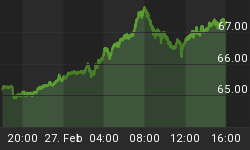Billionaire investor George Soros discusses the crisis in Ukraine and Europe with Bloomberg Television's Francine Lacqua and said, Europe faces 25 years of Japanese-style stagnation unless politicians pursue further integration of the currency bloc and change policies that have discouraged banks from lending, "[Europe] may not survive 25 years of stagnation. You have to go further with the integration. You have to solve the banking problem, because Europe is lagging behind the rest of the world in sorting out its banks."
Courtesy of Bloomberg Television
Highlights:
George Soros on what is facing Europe today:
"What is facing Europe, unless there is a more radical change is a long period of stagnation. Nations can survive in that way. Japan is just trying to break-out of 25 years of stagnation, where Europe is just entering. The European Union is not a nation. It's an incomplete association of nations and it may not survive 25 years of stagnation.
"The financial crisis as such is over. But now we are facing a political crisis, because the Euro crisis has transformed what was meant to be a voluntary association of equal sovereign states that sacrificed part of their sovereignty for the common good into something radically different. It is now a relationship between creditors and debtors, where the debtors have difficulty in paying and servicing their debt and that puts the creditors in charge. And that divides the Eurozone into two classes - the creditors and debtors. The creditors are in charge and unfortunately the policy that Germany in particular is imposing on Europe is counter-productive and is making the condition of the debtor countries worse and worse. So, right now Europe is already growing a little bit, the Eurozone, but that's only because Germany is forging ahead and more than let's say Italy and Spain are falling behind."
On Central Banks and whether he cares about the weakness we saw in the data and deflation:
"That's going to be a very tough year for the banks. They are under pressure, because they have to meet the stress test. The banks have an interest in passing the stress test rather than reviving credit to the economy, so the banks have a transmission mechanism for the people's savings channeling it into the real economy. They are not fulfilling their function."
On Ukraine's impact on Europe:
"Ukraine is a wake-up call to Europe, because Russia has emerged as a rival to the European Union. Putin has tried to reconstitute the Russian empire as a rival for the European Union and has been very successful politically. Not terribly unsuccessful financially and economically, because the Russian economy is not doing well at all, but Putin has outplayed, outmaneuvered the European Union, because Europe it [inaudible] to form, it demanded too much and offered too little. So, it wasn't difficult for Putin to output it. But the Ukrainian people stood up and demonstrated by actually sacrificing their lives. Their commitment to be part of Europe, so this is a challenge for Europe and Europe needs to rediscover its own European identity instead of each country just pursuing its national interests and getting further and further into conflict with the others. There are certain core principles and this is a political thing - democracy, open society, freedom that Europe has believed in and ought to actually stand up and be united."
"Putin has a very different idea of what a society should be like. He believes that people can be manipulated. He actually has got a blind spot. It's beyond his comprehension that people can spontaneously resist. He believes that if Ukraine resists that there is a conspiracy that people, that Americans, CIA, my foundation are conspiring to threaten him or to undermine is policies. And that's not the case, people do believe in freedom."















